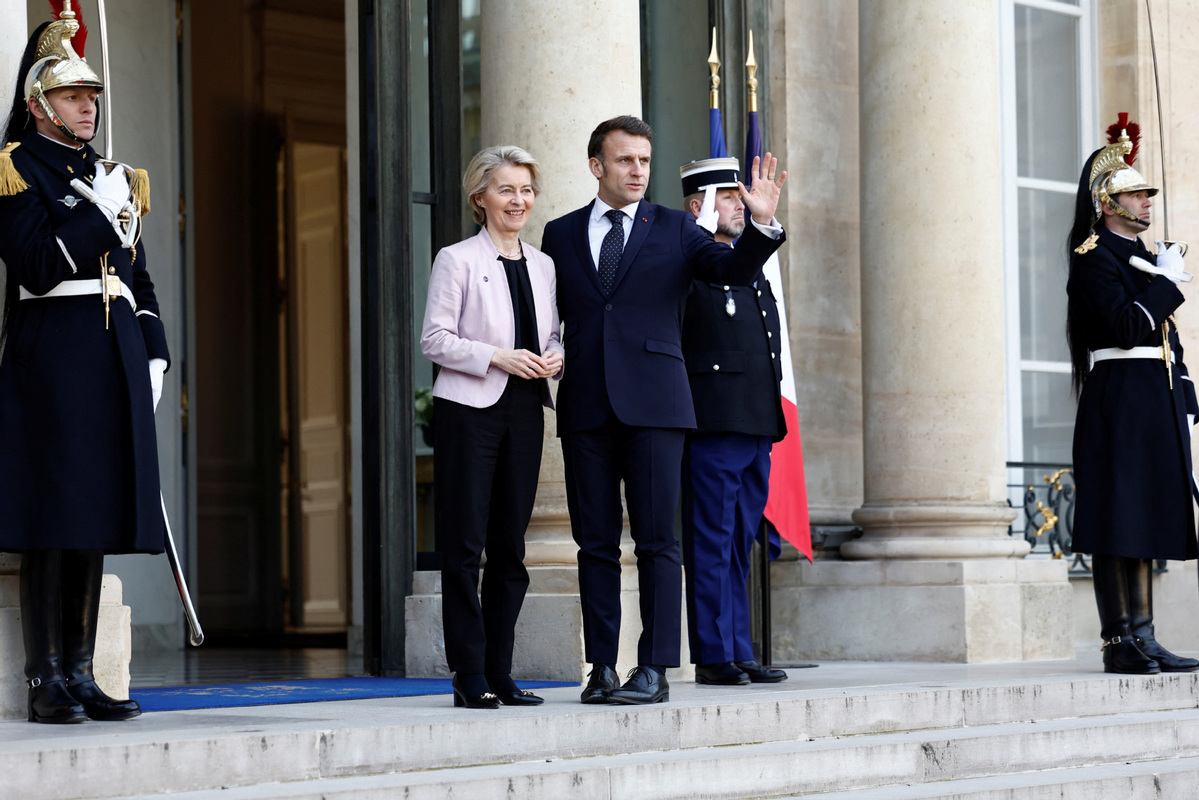
French President Emmanuel Macron welcomes European Commission President Ursula von der Leyen as she arrives for a meeting with European leaders on Ukraine and European security at the Elysee Palace in Paris, France, February 17, 2025. [Photo/Agencies]
European Commission President Ursula von der Leyen said the security of the continent is "at a turning point" and an "urgency mindset" is needed as senior figures from across Europe gathered in Paris on Monday to consider how to respond to the latest developments in the Russia-Ukraine conflict.
France's President Emmanuel Macron convened the short-notice gathering that featured the heads of several European Union member states, including United Kingdom Prime Minister Keir Starmer, von der Leyen, and Mark Rutte, secretary-general of the NATO military alliance. The meeting happened as representatives from the United States and Russia prepared to meet in Saudi Arabia to discuss the current state of the conflict.
US State Department spokeswoman Tammy Bruce said those talks should not be seen as "something that is about details or moving forward in some kind of a negotiation", but rather that President Donald Trump had asked officials to "follow up effectively" on a call he had last week with his Russian counterpart Vladimir Putin.
However, neither Ukrainian nor European representatives have been asked to attend the talks in the Saudi capital, Riyadh, raising fears about what might be proposed.
Another catalyst for the Paris gathering was a speech by US Vice-President JD Vance at last week's Munich Security Conference, an event that was supposed to focus on Ukraine, but that was instead used to reset cordial relations between the US and Europe going back years.
"Decades of the old relationship between Europe and America are ending," said Vance. "From now on, things will be different, and Europe needs to adjust to that."
This prompted Poland's Prime Minister Donald Tusk to say: "Europe urgently needs its own plan of action concerning Ukraine … or else other global players will decide about our future, not necessarily in line with our own interests."
A French presidential spokesperson said up for discussion in Paris would be "the security guarantees that can be given by the Europeans and the Americans, together or separately", with a possible post-conflict European military presence in Ukraine among ideas.
Starmer has said he would be willing to commit troops. Writing in the Daily Telegraph newspaper about what he called a "a once-in-a-generation moment for the collective security of our continent", he said: "This is not only a question about the future of Ukraine – it is existential for Europe as a whole."
He said putting British soldiers in harm's way would not be a decision taken lightly, "but any role in helping to guarantee Ukraine's security is helping to guarantee the security of our continent, and the security of this country".
Starmer's office confirmed he will visit Washington for talks with Trump before the end of the month, and Macron's representatives said the French president had what was described as a "frank conversation" with his US counterpart before the Paris meeting began.
Sweden's Prime Minister Ulf Kristersson would also consider committing troops to any European force, although he said such a move remained some way off, but Tusk has ruled out Poland sending personnel.
Russia's Foreign Minister Sergei Lavrov dismissed any European involvement in talks, saying "Putin and Trump agreed on the necessity of leaving behind absolutely abnormal relations", and that Europe had nothing to contribute.
"I don't know what they would do at the negotiating table," he told reporters. "If they are going to sit at the negotiating table with the aim of continuing war, then why invite them there?"
His comments were backed up by Russia's Ambassador to the United Nations Vasily Nebenzya, who told a UN security council meeting in New York that both the EU and the UK government were "absolutely unfaithful to their word", and accusing them of being "blinded by primitive Russophobia" and a "maniacal desire to inflict defeat on our country, on the battlefield, using the Ukrainians who are left alive".
julian@mail.chinadailyuk.com